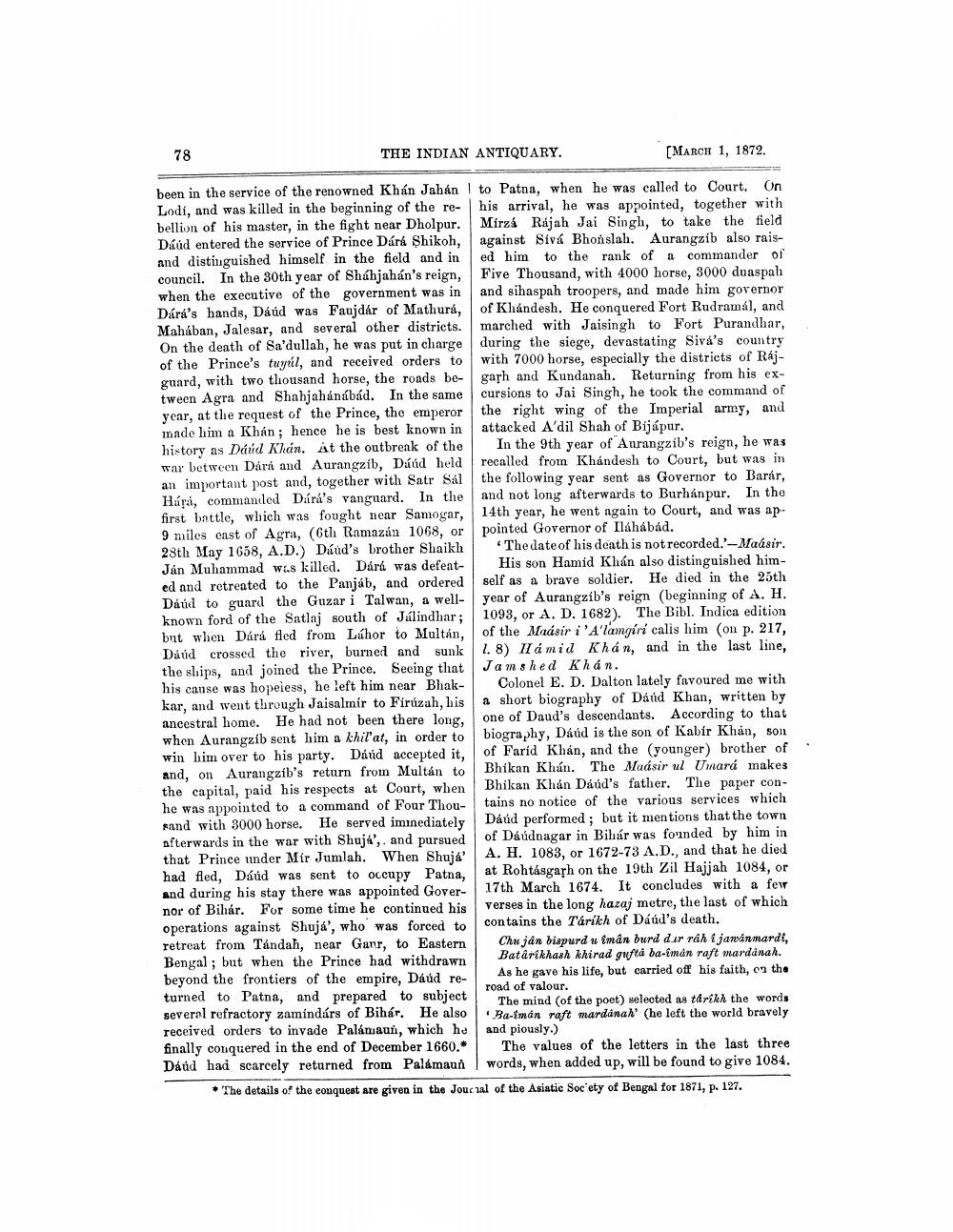________________
78
THE INDIAN ANTIQUARY.
[MARCH 1, 1872.
to Patna, when he was called to Court. On his arrival, he was appointed, together with Mírzá Rájah Jai Singh, to take the field against Sivá Bhonslah. Aurangzib also raised him to the rank of a commander of Five Thousand, with 4000 horse, 3000 duaspah and sihaspah troopers, and made him governor of Khándesh. He conquered Fort Rudramál, and marched with Jaisingh to Fort Purandhar, during the siege, devastating Sivá's country with 7000 horse, especially the districts of Rájgarh and Kundanah. Returning from his excursions to Jai Singh, he took the command of the right wing of the Imperial army, and attacked A'dil Shah of Bijapur.
been in the service of the renowned Khán Jahán Lodí, and was killed in the beginning of the rebellion of his master, in the fight near Dholpur.. Dáúd entered the service of Prince Dárá Shikoh, and distinguished himself in the field and in council. In the 30th year of Shahjahan's reign, when the executive of the government was in Dárá's hands, Dáúd was Faujdár of Mathurá, Mahában, Jalesar, and several other districts. On the death of Sa'dullah, he was put in charge of the Prince's tuyúl, and received orders to guard, with two thousand horse, the roads between Agra and Shahjahánábád. In the same year, at the request of the Prince, the emperor made him a Khán; hence he is best known in history as Dáúd Khán. At the outbreak of the war between Dárá and Aurangzib, Dáúd held an important post and, together with Satr Sál Hárá, commanded Dárá's vanguard. In the first battle, which was fought near Samogar, 9 miles east of Agra, (6th Ramazán 1068, or 28th May 1658, A.D.) Dáud's brother Shaikh Ján Muhammad was killed. Dárá was defeated and retreated to the Panjáb, and ordered Dáúd to guard the Guzar i Talwan, a wellknown ford of the Satlaj south of Jalindhar; but when Dárá fled from Láhor to Multán, Dáúd crossed the river, burned and sunk the ships, and joined the Prince. Seeing that his cause was hopeless, he left him near Bhakkar, and went through Jaisalmír to Firúzah, his ancestral home. He had not been there long, when Aurangzib sent him a khil'at, in order to win him over to his party. Dáúd accepted it, and, on Aurangzib's return from Multán to the capital, paid his respects at Court, when he was appointed to a command of Four Thousand with 3000 horse. He served iminediately afterwards in the war with Shuja',. and pursued that Prince under Mír Jumlah. When Shuja' had fled, Dúúd was sent to occupy Patna, and during his stay there was appointed Governor of Bihár. For some time he continued his operations against Shujá', who was forced to retreat from Tándah, near Ganr, to Eastern Bengal; but when the Prince had withdrawn beyond the frontiers of the empire, Dáúd returned to Patna, and prepared to subject several refractory zamindárs of Bihár. He also received orders to invade Palámaun, which he finally conquered in the end of December 1660.* Dáúd had scarcely returned from Palámaun
In the 9th year of Aurangzib's reign, he was recalled from Khándesh to Court, but was in the following year sent as Governor to Barár, and not long afterwards to Burhanpur. In the 14th year, he went again to Court, and was ap pointed Governor of Iláhábád.
The date of his death is not recorded.'-Maásir. His son Hamid Khán also distinguished himself as a brave soldier. He died in the 25th year of Aurangzib's reign (beginning of A. H. 1093, or A. D. 1682). The Bibl. Indica edition of the Maásir i'A'lamgiri calis him (on p. 217, 1. 8) Hámid Khán, and in the last line, Jamshed Khán.
Colonel E. D. Dalton lately favoured me with a short biography of Dáúd Khan, written by one of Daud's descendants. According to that biography, Dáúd is the son of Kabir Khan, son of Farid Khán, and the (younger) brother of Bhikan Khán. The Mudsir ul Umard makes Bhikan Khán Dáud’s father. The paper contains no notice of the various services which Dáúd performed; but it mentions that the town of Dáúdnagar in Bihar was founded by him in A. H. 1083, or 1672-73 A.D., and that he died at Rohtásgarh on the 19th Zil Hajjah 1084, or 17th March 1674. It concludes with a few verses in the long hazaj metre, the last of which contains the Tárikh of Dáúd's death.
Chu jan bispurd u imân burd dir rahi jawanmardi, Batarikhash khirad guftâ ba-îmân raft mardanah. As he gave his life, but carried off his faith, on the road of valour.
The mind (of the poet) selected as tarikh the words Ba-imán raft mardanah' (he left the world bravely and piously.)
The values of the letters in the last three words, when added up, will be found to give 1084. The details of the conquest are given in the Journal of the Asiatic Society of Bengal for 1871, p. 127.




